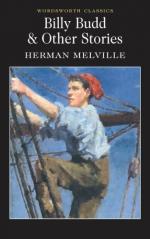|
This section contains 3,760 words (approx. 13 pages at 300 words per page) |

|
SOURCE: “Billy Budd: The Catastrophe of Innocence,” in Modern Language Notes, Vol. 73, No. 3, March, 1958, pp. 168–76.
In the following essay, Miller considers the symbolism and significance of the character Billy Budd, focusing on the nature of his innocence.
Billy Budd has the distinction of being Melville's final fiction, the last embodiment of his complex vision.1 In it Melville did not attempt to find new truth through an old form but discovered a new form for an old, familiar theme. The theme may be found explicitly formulated as early as 1850 in White Jacket. There, placed in one of the inconspicuous chapters is the narrator's comment, arising from his witnessing the paradoxical Christian prayer of a “murderous,” death-dealing man-of-war canoneer, that given the current social construction of the world, which seems so “ill-adapted to the practical adoption of the meekness of Christianity,” there is some basis for believing “that although our...
|
This section contains 3,760 words (approx. 13 pages at 300 words per page) |

|


